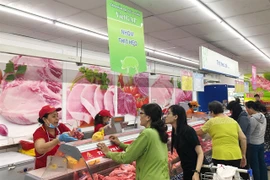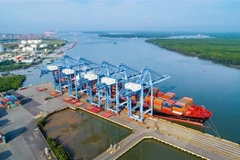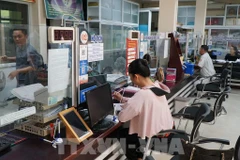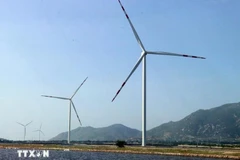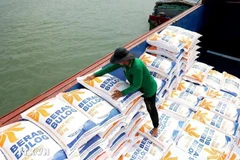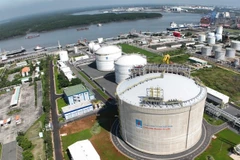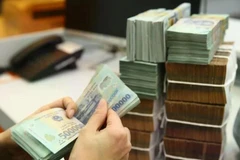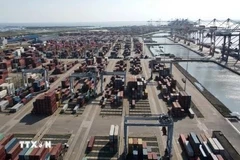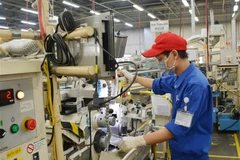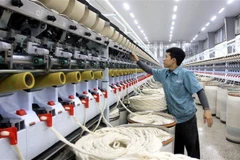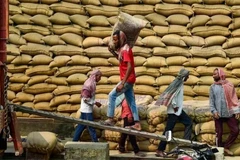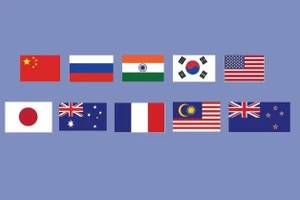 Each near-Tet month is forecast to be short of 25,000-30,000 tonnes of slaughter-weight of pork (Photo: VietnamPlus)
Each near-Tet month is forecast to be short of 25,000-30,000 tonnes of slaughter-weight of pork (Photo: VietnamPlus)
Hanoi (VNA) – The Ministry of Industry and Trade and the Ministry of Agriculture and Rural Development have agreed to consider the possibility of official import of pork with reasonable prices to offset the domestic shortage.
The supply of port is lower than the same period last year but authorities have rated this as not so serious.
The Ministry of Industry and Trade and the Ministry of Finance have held working sessions and worked out various measures to ensure the balance of necessities, especially pork, to ward off negative information that may cause uncertainties in the market.
Shortage not a crisis
According to a recent assessment by the Ministry of Industry and Trade and the Ministry of Agriculture and Rural development, the supply of pork in the three near-Tet months (from November 2019 to January 2020) will be 200,000 tonnes short of the demand, or about 70,000 tonnes each month. Along with this, the prices of pigs in a number of localities are increasing strongly, amounting to 70,000-76,000 VND per kilo in the north and 70,000-75,000 VND per kilo in the south.
It is clear that the complicated development of the African swine fever has caused great losses to the domestic animal husbandry. The pig herd in October 2019 was 20 percent less than that of the same time a year earlier. Besides, according to representatives of the Ministry of Industry and Trade, the containment of the spread of the disease has also caused imbalance in the supply and demand in a number of localities, pushing the prices up and adversely affecting psychology in the market.
Speaking to the press, Acting Director of the Animal Husbandry Department of the Ministry of Agriculture and Rural Development Nguyen Xuan Duong said the pork shortage is not up to the level of a crisis as the herds in many localities like Bac Giang and Hung Yen provinces are still relatively large, pointing out that the circulation and false information have caused a negative social effect and psychology.
 Ministry of Industry and Trade and Ministry of Agriculture and Rural Development have prepared options to ensure supply-demand balance for necessities by the year’s end (Photo: VietnamPlus)
Ministry of Industry and Trade and Ministry of Agriculture and Rural Development have prepared options to ensure supply-demand balance for necessities by the year’s end (Photo: VietnamPlus)
Import readied to stabilise market
Currently many major firms have worked out plans to stabilize the market, such as the C.P. that is supplying 3,500-4,000 pigs each day to the northern market.
According to Kieu Dinh Thep, Business Director of the C.P. Vietnam, the firm’s supply increases about 10 percent over the same period last year. However, it is only supplying pigs to customers who have signed business contracts with it. “Under any circumstances, we can ensure the sufficient supply for the sake of the long-term relations between our firm and our customers,” Thep stressed.
To ensure the supply-demand balance, Deputy Minister of Industry and Trade Do Thang Hai said provincial departments are collaborating with relevant authorities and businesses to work out plans on the preparation of the food supply, first of all pork. Besides, the ministry has also held working sessions with the People’s Committees of major localities on plans to stabilize the market at the year’s end, with a focus on ensuring the pork supply.
“On the basis of the assessment of the production and consumption, the Ministry of Industry and Trade and the Ministry of Agriculture and Rural Development have agreed, if necessary, to consider the possibility of officially importing pork from safe sources with reasonable prices to offset the domestic shortage and rein in the price hike,” said a representative of the Ministry of Industry and Trade.
The ministry has asked other ministries and local authorities to intensify the control of the market and prevent the unofficial trade of pork. Besides, it has also asked the Ministry of Agriculture and Rural Development to facilitate the circulation of safe pork and pork products so as to ease the price hike.
During a working session on November 18, Deputy Prime Minister Vuong Dinh Hue ordered the Ministry of Agriculture and Rural Development to join hands with the Ministry of Industry and Trade in making a comprehensive assessment on the shortage of pork which will serve as a basis for proposing the quantity of import to offset the domestic shortage./.



